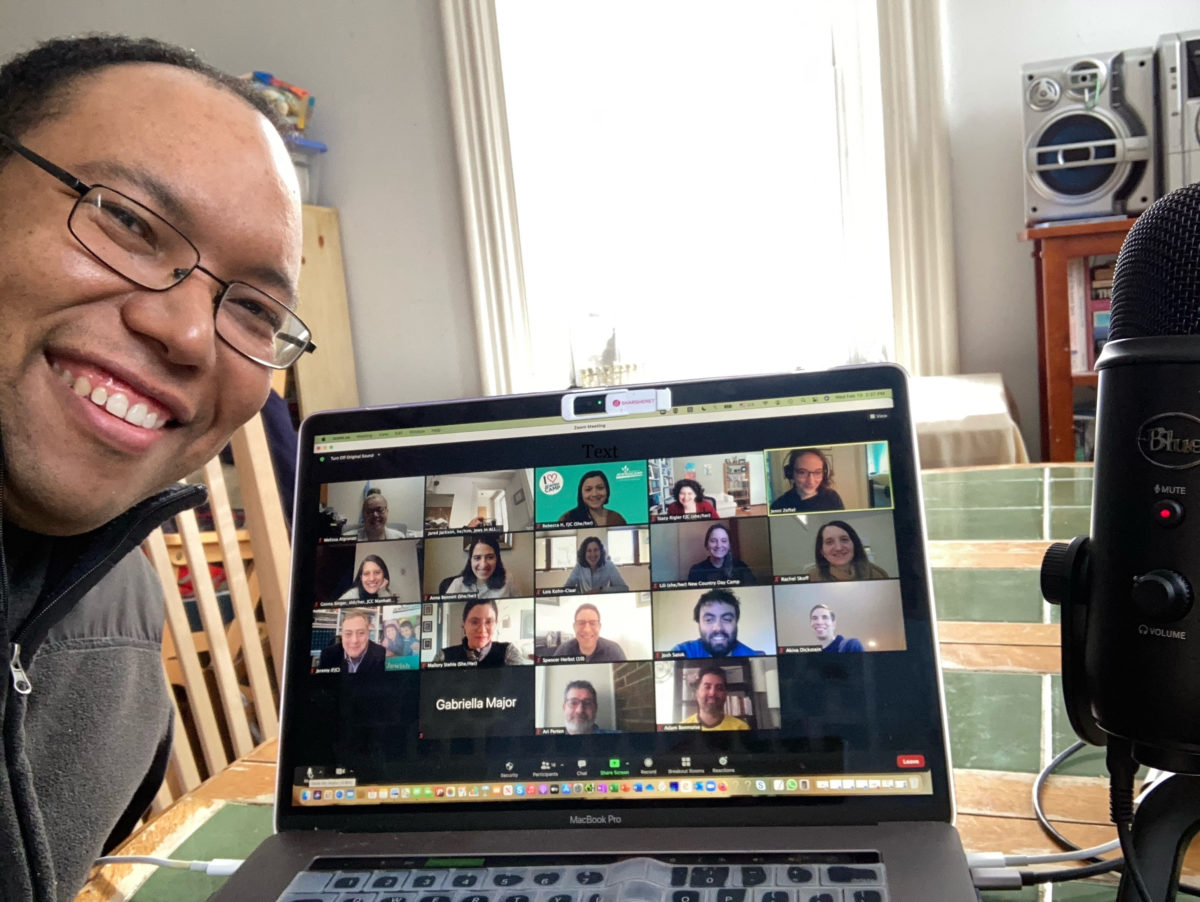Your Daily Phil: How The Israel Summit, a student-led conference, expanded amid the pandemic
Good Thursday morning!
Ed note: In honor of President’s Day weekend, the next edition of Your Daily Phil will arrive on Tuesday.
The Jewish Federations of North America, which has assisted Jewish organizations applying for the federal government’s Nonprofit Security Grants Program, will now offer that training to other faith groups. About 60% of the $90 million allocated for the program went to Jewish groups last year; this year, the amount of funding available has doubled, in part due to lobbying from JFNA and other organizations, including the Orthodox Union, that have pushed for extra support.
“We’re the most at risk, and other groups are at risk,” Elana Broitman, JFNA’s senior vice president for public affairs, told eJewishPhilanthropy. The application for the program, which funds physical improvements that make houses of worship and other nonprofits safer, will be available at the end of February. The National Council of Churches and the U.S. Council of Muslim Organizations are among the groups that will attend the seminar.
BIGGER ONLINE
The Israel Summit leverages the pandemic to reach more people


The Israel Summit concludes today after five days of programming designed to broaden a campus conversation about Israel that has often reduced the country to its regional conflicts. More than 10,000 people registered to attend the mostly virtual event, which started in 2018 at Harvard University, Aidan Golub, its executive director and a Harvard student, told eJewishPhilanthropy. “We are looking to combat not only the antipathy but also the apathy,” Golub said, pointing out that some Jewish students are afraid to talk about Israel.
Background: Roughly 400 people attended the first summit in 2018. The original intent, Golub said, was to combat anti-Israel rhetoric on college campuses by offering a more well-rounded picture of Israeli life and society, including speakers like Israeli fashion designer Elie Tahari and Amar’e Stoudemire, who was playing basketball in Jerusalem that year. In 2019, Northwestern University and the University of Chicago held a joint summit, as did the University of Michigan.
Pandemic response: In 2020, the plan was to return the event to Harvard, but when the pandemic hit, the summit’s leaders realized they could grow their audience by holding the summit online. “We had a unique opportunity to allow us to engage more students, across more campuses, than we’d ever thought possible, said Golub. They also came to understand that as the world moved online, the quality of remote experiences would improve, and they would need high production values. Golub took off his sophomore year to focus on the summit full-time.
Growth plan: “The Israel Summit had to be much more than a Zoom call if we wanted to impact our audience,” he said. Columbia University had also been planning a summit, so the schools joined forces. A team of about 30 students at both schools built the event with the help of 100 managers on different campuses who worked to generate in-person enthusiasm and activity — including watch parties — around the summit. They hired the Indianapolis-based Business Media Group to run the event, Golub said. Glitch Agency, in Tel Aviv, produced the video. They raised $200,000 to pay for the event from both individuals and organizations. The event’s homepage bears the logos of more than 70 supporting organizations, including companies, such as Waze, and non-profits, including the Union of Reform Judaism and Hillel International.
The five days: Each day followed a similar schedule. Four or five speakers — the list includes Israeli television star Lior Raz and Sen. Cory Booker (D-NJ) — were interviewed by students; the interviews were broadcast two times a day, once for U.S. participants and once for those outside the country. On Feb. 9, there was also an interactive career and study abroad fair. “It’s an expression of Jewish student leadership in action,” said Hillel International CEO Adam Lehman. “They’re expressing their Zionism, with thousands of other students.”
OP-ED
How a focus on disability inclusion has prepared us to face the pandemic


Courtesy Hillel International
Isolation. Anxiety. Blurred lines between the professional and the personal. Fear of being stigmatized or labeled by those around us. Most, if not all, of us have grappled with these demons since the pandemic took hold nearly a year ago, write Iraq war veteran Ilya Bratman and Hillel International professional Hannah Henschel in a piece marking Jewish Disability Advocacy Month.
Beginnings: For Ilya, preparation began in 2017, when he was working as the executive director at the Hillel at Baruch College. An Iraq war veteran, he also served as the campus’ veterans faculty advisor. Publicly, he served his community with pride. Privately, he struggled with physical and mental pain that he would soon learn were part of his post-traumatic stress disorder (PTSD). For Hannah, inclusivity in Jewish spaces has been top of mind since childhood, when a hearing disability quickly showed which experiences and communities were truly welcoming.
What happened next: Enter Hillel International’s fledgling Employee Resource Groups, which emerged in 2018 as an outgrowth of several years’ worth of disability inclusion work at the international level. From campus-specific trainings and internships to movement-wide commitments around universal design, the concept of inclusivity as a core value had picked up steam. Eventually, a peer-led focus group of people who self-identified as living with a disability became a critical inflection point. It turns out, getting the right people in the right place can change everything — or, as some of us are fond of saying, “Nothing about us without us.”
End game: The pandemic has shined a light on Hillel’s disability inclusion work and brought it front and center in a way many of us never anticipated. Envisioning programming that works in person, yet also translates to a virtual setting for those who can’t leave their homes? No longer optional. Designing experiences that can be universally accessible? A top priority. Finding partners who share our commitment to inclusivity? Non-negotiable.
OP_ED
Making systemic change — during a pandemic and beyond


Courtesy
It may be a truism to say that broad and long-term Jewish community change is necessary, but that doesn’t make it more likely to happen, write Natana Shek and Dena Libman.
The Idea: Passport to Jewish Life was created in 2018 to reimagine how people could connect to their own Judaism and to community. Montreal’s Federation CJA and a Funders Collaborative developed a bold theory of change, to increase the quality, quantity and diversity of Jewish opportunities and programs in the city.
Process: In true collaborative fashion, each partner took on different roles. The expertise and infrastructure offered by Federation CJA provided the engine for growth. Since the foundations recognized that high risk can yield high rewards, large-scale projects were identified that could push beyond the limits of more traditional initiatives. By giving them the “Passport to Jewish Life” brand, we hoped to engage more organizations and people through a new, more accessible point of entry.
Investments: In our theory of change, we prioritized approaches that could bring about the transformation we envisioned. Our first investments were a professional development program and a bold new technology initiative that will be piloted in Montreal and Detroit and is poised to be a game-changing tool for communities across North America.
Result: As the first initiatives are now underway, the partnership between the Federation and the funding collaborative is now considering new directions. Our aim is to take steps toward change that will bring the community organizations closer to people, and people closer to the community.
Worthy Reads
Community Comms
Apply! Want to join the team at Jewish Insider/eJewish Philanthropy? We’re looking for a top-notch philanthropy editor at eJP. Learn more here.
Be featured: Email us to inform the eJP readership of your upcoming event, job opening, or other communication.
Word on the Street
Steven Spielberg has been selected as the 2021 Genesis Prize laureate… Repair the World and JTS have announced a new partnership… Teva Pharmaceuticals is in talks with COVID-19 vaccine manufacturers to co-produce their vaccines… Following the most recent lockdown, Israel will begin to reopen schools tomorrow… The H&S Davidson Trust and Jigsaw have unveiled a new global research project on how philanthropy can better support good projects to reach scale… Drs. Felix and Miriam Glaubach have donated $10 million to support the work of the Yeshiva University Career Center… GoFundMe Charity is being merged into GoFundMe.com, shutting down the fundraising-dedicated site on Sept. 30…
Pic of the Day


COURTESY JARED JACKSON
Jared Jackson, founder of Jews in All Hues, and colleagues gathered yesterday for a virtual “site visit” to discuss the Diversity, Equity and Inclusion (DEI) training he is conducting with UJA-Federation of New York and six area day camps.
Birthdays


Courtesy Shlomo Lipetz
VP of programming at City Winery, he is also a pitcher for Team Israel who secured the final out in the team’s 2019 qualification for the 2021 Olympics, Shlomo Lipetz …
Los Angeles attorney, Shirley Cannon Munch … Journalist and author of a Passover Haggadah co-written with his late wife Cokie Roberts, Steven V. Roberts … Former Knesset member for the Jewish Home and Likud parties, Eliyahu Michael “Eli” Ben-Dahan … National medical director of Seasons Hospice and Palliative Care, Gary E. Applebaum, MD … Principal at Buck Global, LLC, Alan Vorchheimer … Admin and special project coordinator for Jewish Renewal programs at JDC, Debbie Halali … Founder and president of RAINN, Scott Berkowitz … Elected as a member of the Broward County (Florida) School Board in the months following the death of her 14-year-old daughter Alyssa at the Marjory Stoneman Douglas High School shooting, Lori Alhadeff … SVP of global public affairs at Blackstone, Ilana Ozernoy Mouritzen … Deputy director of project management for Politico, Michelle Zar … Senior account manager at Politico, Rachel Kosberg …








